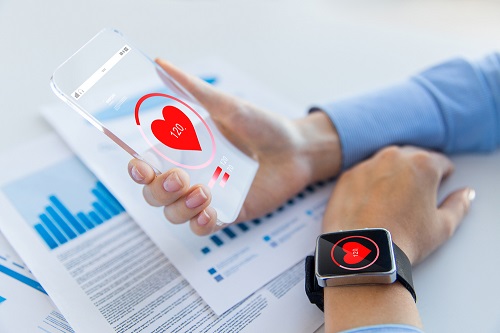This month, we’re going to take a look at advances in wellness and the future of the industry in 2023, and how this might apply to you as an expat. The wellness industry is, like any good business, in a constant process of development and change. AI and the rise of apps are contributing significantly to this process: you can now download a plethora of apps for nutrition, sleep pattern tracking, meditation and fitness. Autonomous Sensory Meridian Response (ASMR) videos provide a form of soothing semi-hypnosis/paraesthesia generated by voices and different sounds and have become a huge hit on YouTube.
The McKinsey Wellness survey in 2021 identified six key areas of wellness:
- health
- fitness
- nutrition
- appearance
- sleep
- mindfulness
Healthcare technology
It also asked wellness experts to predict the state of the industry in 2030, and not surprisingly, technology plays a major part in this. An increasing reliance on input from medical AIs, medical tech in the home, and tracking your own exercise and health will be a feature in the near future. Data related to quality of sleep is going to become increasingly popular: sensors beneath your mattress can track your sleep patterns, and these sensors could send information to your in-home exercise equipment so that your daily exercise programme becomes tailored to the quality of your sleep.
Wearables will become a part of many people’s lives, such as FitBits and Smartwatches, which can monitor not only your exercise patterns but also your heart rate, which could benefit people with cardiac irregularities (some wearables can communicate directly with your doctor). The Move ECG, for instance, can measure an electrocardiogram and send the readouts to your medical practice, as well as tracking your heart rate across a range of activities.
In 2019 Omron Healthcare launched a wearable blood pressure monitor – not the bulky device which you may have used on the insistence of your doctor, but an oscillometric monitor to record your daily activity and take your blood pressure. HeartGuide comes with an associated mobile app, HeartAdvisor, which can advise on keeping your cardiac system in optimal health. Device connectivity is set to become ever more sophisticated, as is sensor accuracy.
Impact on insurance
Insider Intelligence reports that health app users will increase from 88.5 million in 2022 to 91.3 million in 2023. In the USA, the consumer use of wearable technology has increased from 9% to 33% over the past four years. This is having an impact not only on individual healthcare, but also on individual insurance. Insider Intelligence reports that:
“Insurers can lessen the rising cost per patient by using wearables as a means of increasing customer life value. Wearable technology incentivizes behavior that reduces hospital visits and readmissions due to poorly managed personal health. In a 2021 CVS Health Care Insights study conducted by Market Measurement, 75% of the 1,000 users who were surveyed agreed that wearables help them engage with their own health.”
Health monitoring at work
UK commercial director for physiological analytics firm Firstbeat, Tim Wright, says that Human Resource and corporate development teams are driving these trends, with insurance companies trailing behind. With the data accrued, companies are able to assess employees’ levels of anxiety, stress, and even burnout and take (hopefully positive) action accordingly.
Can one take a dystopian view of all this, and foresee a future in which refusing to wear a monitoring device might negatively affect your health insurance premiums? Or in which certain employers will insist on employees accepting wearable technology as a condition of corporate insurance? There are some significant concerns , plus the added issue of an increase in surveillance technology – in which the masses become willing participants in their own external monitoring. More and more companies are offering wearables to their staff, and this may be particularly relevant if you are working abroad for a company that covers your health insurance and liaises with the healthcare/health insurance companies locally, whether state run or private.
You may also simply not want your medical data to be shared with your employer. There are privacy considerations here, and not everyone wants their HR department snooping on them via a wrist monitor. Science fiction writers have already predicted a future where a sneaky cigarette or a second glass of wine can have you hauled up before your boss in the morning to ask why you’re jeopardising your health – and therefore your job.
Virtual healthcare
Enough gloom however; let’s return to the positive. Virtual healthcare is now a reality for many expats, particularly, it seems, in the UAE where 54% of expat residents are likely to turn to virtual apps for their healthcare needs. Virtual interfaces may prove particularly helpful if you live in a rural area overseas, in a region where accessing a local clinic may not be easy or even possible (this depends on access to mobile coverage, of course). Experts in AI predict that virtual doctors could in time become literal lifesavers in developing countries.
Personalisation and connectivity are the buzzwords here, with mobile apps working in tandem with your healthcare provider to optimize your own wellness plan, whether that involves sleep, nutrition, mental health, exercise, or all four. If you prefer to rely on your own doctor, apps and wearables could provide a way of accessing your own healthcare provider back home.
William Ker Tyler, Fit for Leadership CEO, says:
“Data only has benefit if it leads to the development of thoughts and focuses individuals on areas of their health they may want to improve on, and organisations on employee health and wellness areas they may want to support.”
Whatever one’s views, however, wellness wearables appear to be becoming an integral part of the history of human health.

